Marriage in Muslim Law? Essential of Muslim Law and its Types

Introduction: Marriage is a sacred institution in Islam and is considered one of the most significant events in a Muslim’s life. In Islamic law, marriage is not just a social custom but is also a religious obligation. The Quran and Hadith lay out the guidelines and rules for marriage in Islam. In this article, we will discuss the essential aspects of marriage in Muslim law and the two types of marriages recognized by Islamic law.
Essential aspects of marriage in Muslim law:
- Agreement: Marriage in Islam is a contract between two parties. The bride and groom must agree to enter into this contract of their own free will. There should be no coercion or pressure on either party to get married. The agreement should be entered into with complete sincerity and honesty.
- Consent: Consent of the bride and groom is essential in Islamic law. The bride and groom should give their consent to the marriage freely and willingly. The consent of the bride is considered more important than the groom’s consent, and it must be given in the presence of two Muslim witnesses.
- Mahr: Mahr is a mandatory payment made by the groom to the bride at the time of the marriage contract. The mahr can be any amount agreed upon by the bride and groom. It is a token of the husband’s commitment to his wife, and it remains her property even in the event of a divorce.
- Witnesses: Two Muslim witnesses are required for the marriage contract to be valid. The witnesses must be present at the time of the marriage contract and should be of sound mind and adult age.
- Public declaration: The marriage contract must be publicly declared in front of the witnesses. It is also customary to announce the marriage publicly to the community.
Types of marriages recognized in Islamic law:
- Nikah: Nikah is the most common type of marriage in Muslim law. It is a contract between the bride and groom, where they agree to live together as husband and wife. The nikah ceremony is usually performed in the presence of two Muslim witnesses. The couple must give their consent to the marriage and agree to the terms of the marriage contract. The mahr is also a crucial part of the nikah ceremony, and the groom must pay the mahr to the bride. The nikah ceremony can be performed by a Muslim judge, an imam, or any Muslim person who is authorized to perform the marriage.
- Mut’ah: Mut’ah is a temporary marriage in which the couple agrees to be married for a specific period. This type of marriage is not recognized in all Muslim sects, and it is more commonly practiced by Shia Muslims. The duration of mut’ah can range from a few hours to several years, and it is usually agreed upon before the marriage contract is signed. The couple agrees on the terms of the marriage contract, including the mahr, and the duration of the marriage. At the end of the agreed-upon period, the marriage contract expires, and the couple is no longer considered married.
In conclusion, marriage is an essential part of Muslim law, and it is considered a religious and social obligation for Muslims. In Islam, marriage is a contract between two parties, and it is a sacred bond that should be entered into with utmost sincerity and honesty. Muslim law recognizes two types of marriages: Nikah and Mut’ah. Both types of marriages have their own unique features, but the essential aspects of marriage, such as agreement, consent, mahr, witnesses, and public declaration, are essential in both. Marriage is considered a partnership between two individuals, and both the bride and groom have rights and obligations towards each other. Finally, marriage is also considered a means of achieving spiritual growth and closeness to Allah, and it is a way of fulfilling one’s obligations towards society.
Tags: essential of marriage in muslim or islamic law, marriage in islamic law, marriage in muslim law, types of marriage in islamic law